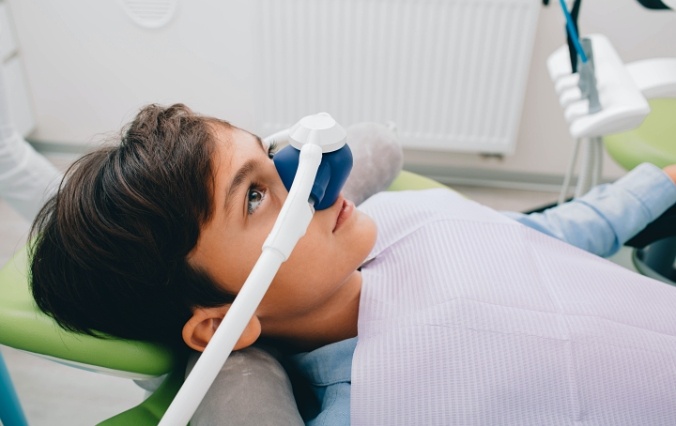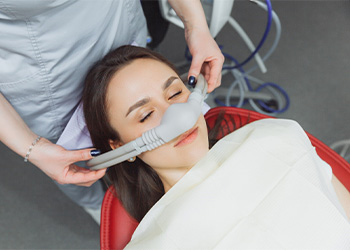Sedation Dentistry – Broken Arrow, OK
Making Your Appointments Relaxing
Plenty of people are nervous about getting in the dental chair. Our team at Berkshire Dental Group will be here to make you feel welcome and at ease, but naturally, people with serious dental phobias might need a bit more help. When you call to set up an appointment, you can ask about having nitrous oxide sedation or IV sedation dentistry performed to help you stay calm during the procedure. Don’t let fear stop you from caring for your smile. Ask about sedation dentistry in Broken Arrow, OK
Why Choose
Berkshire Dental Group
for Sedation Dentistry?
- Nitrous Oxide and IV Sedation Options
- Experienced and Caring Dental Team
- Faith-Based Dental Office with Advanced Technology
Nitrous Oxide Sedation

If you only have mild dental anxiety, then it’s best to use a sedation option that will quiet your worries without disrupting the rest of your day. Nitrous oxide (commonly referred to as “laughing gas”) does exactly that! After a few minutes of breathing in the odorless, colorless gas, you’ll begin to feel light, euphoric, and utterly calm. Once your treatment is done, all we need to do is switch it off – the effects will dissipate almost instantly.
Who Is a Good Candidate for Nitrous Oxide?

Nitrous oxide has been extensively tested, and it’s considered to be safe for children and adults alike. So, if you struggle with a strong gag reflex, uncomfortable dental sensitivity, dental-related anxiety, or something similar, it’s definitely worth scheduling a consultation with our Broken Arrow dental team to see if you’re a candidate. From there, we can learn more about your dental history, allergies, and any medications you’re taking. If you’re pregnant or have a condition that makes it difficult to breathe, then we will work with you to find another way to keep you calm and comfortable throughout your treatment.
How Does Nitrous Oxide Work?

Nitrous oxide is administered through a small, comfortable nasal mask. It only takes a few minutes for the effects to set in too. Contrary to what many people believe, it won’t put you to sleep; it’ll just induce an advanced state of relaxation. Throughout your treatment, you’ll be awake, allowing you to ask questions, respond to verbal cues, or request more or less of the nitrous. Once we’re done administering the necessary preventive, restorative, or cosmetic care, we will remove the mask, so you breathe in just oxygen again.
Aftercare for Nitrous Oxide

As we mentioned above, the effects of nitrous oxide wear off within a few minutes. That means that there are basically no aftercare instructions; you’ll even be able to drive home by yourself! Of course, we will provide you with any necessary information to help you recover if you received more extensive restorative or emergency care. This could include everything from rinsing periodically with warm saltwater and taking OTC pain medication as directed to sticking to soft foods while your temporary restoration is in place.
IV Sedation
While nitrous oxide is great for routine work or mild anxiety, sometimes a more powerful solution becomes necessary. IV sedation is reserved for patients with severe phobias or those who need extensive treatment. We have the requisite training to handle complex sedation so that you can receive required care while staying completely comfortable and safe at all times. If you could benefit from IV sedation, don’t hesitate to ask us about it before your next appointment.
Sedation Dentistry FAQs

While sedation dentistry is meant to help put dental anxieties to rest, some people understandably have a few questions that they want to have answered before they agree to the process. Below, we’ve listed clear, concise answers to some of the inquiries that we’ve heard most often when discussing sedation dentistry with our patients. If you have concerns of your own that aren’t addressed here, please give our office a call to learn more.
Is Sedation Dentistry Safe?
Sedation dentistry is an extremely safe option for most people. Dentists have been using IV sedation for decades, so the process is well understood, and complications are very rare. We will need to review your medical history and any current medications you might be taking to confirm that there won’t be any negative interactions, but once we’ve done so, you won’t have anything to worry about. Our team will closely monitor your vitals – including your blood pressure, your oxygen levels, and your heart rate – at all times to ensure that there are no problems. We can also adjust sedation levels during your treatment for the sake of your safety and comfort.
Will I Remember Anything with Dental Sedation?
The answer is most likely “no.” Even though dental sedation does not actually render you unconscious, it does have tend to have a memory loss effect where you don’t remember anything that happened while you’re under the effects of the medication. This is particularly true with IV sedation, which is more likely to make you forget your procedure than other common types of dental sedation. For people with extreme dental anxiety or who have had negative dental experiences in the past, the memory loss can be seen as a benefit, as it means they can get the care they need without having to remember the actual experience.
How Much Does Sedation Dentistry Cost?
It generally depends on the circumstances. IV sedation usually costs more than nitrous oxide. This is largely due to the fact that more training is required to administer IV sedation. There are other factors to consider as well, such as how long you’re under the sedative’s effects; the higher the dosage, the more you’ll eventually end up paying. When we’re reviewing the cost of sedation dentistry with you, we can outline your options for making it more affordable. Dental insurance doesn’t typically include coverage for sedation, but you can still sign up for financing through CareCredit to make it easier to pay for your treatment without breaking your budget.
Will I Feel Any Pain with Dental Sedation?
Dental sedation puts your body in a highly relaxed state. While under the effects of the medication, your ability to register pain will be significantly suppressed. As a result, you’ll experience little if any pain. Any discomfort that does occur will most likely just feel like pressure rather than actual pain. Also, depending on the procedure in question, we may also numb your mouth with a local anesthetic to keep you as comfortable as possible.
What Is the Difference Between IV Sedation and General Anesthesia?
Some people mistakenly believe that IV sedation and general anesthesia are the same thing because they both involve the insertion of an intravenous needle. However, there are differences between them. IV sedation may make you feel sleepy, but it does not cause complete unconsciousness.
General anesthesia, on the other hand, is designed to cause total unconsciousness. It is much more complex than regular IV sedation and should only be performed under the supervision of a highly trained specialist.
Does IV Sedation Have Any Risks?
While IV sedation is generally considered safe, it is not totally risk-free. As with any medical procedure, there is always a minimal chance of complications. For example, a very small percentage of people experience respiratory distress while under IV sedation. We carefully monitor patients so that if this happens, we can take fast action to address the matter.
We are also careful to screen patients before approving them for IV sedation. Depending on your medical history, health conditions, and current medications, we might determine that this form of sedation is too risky for you. We may recommend a different relaxation method instead.
What Does IV Sedation Feel Like?
Everyone has a slightly different experience with IV sedation, but most people start to feel extremely relaxed within moments after we start to administer the sedative medication. Your anxieties may melt away, and you may start to feel sleepy. Some people even doze off during their treatment. After the sedation wears off, you might have no memory of what happened during your procedure.
How Should I Prepare for IV Sedation?
To make sure that your IV sedation experience is as easy and low-risk as possible, we may direct you to take some practical measures leading up to your procedure. For example, you might need to:
- Avoid eating and drinking for at least 6 hours before your procedure.
- Wear loose and comfortable clothing that does not restrict your breathing.
- Wash off any makeup so we can clearly see the color of your skin during your procedure.
- Remove your contact lenses.
Am I a Good Candidate for IV Sedation Dentistry?
If you have been delaying necessary dental care due to fear or anxiety, there is a chance that IV sedation is right for you. Of course, there are reasons besides anxiety that might make you a good candidate for this provision. For example, it can also be helpful for individuals with a strong gag reflex, people who need extensive procedures, and those who find it difficult to remain still for long periods of time.
Before you undergo IV sedation, our team will learn about the details of your case and ask about your medical history so we can determine the best way to help you have a positive dental care experience.
